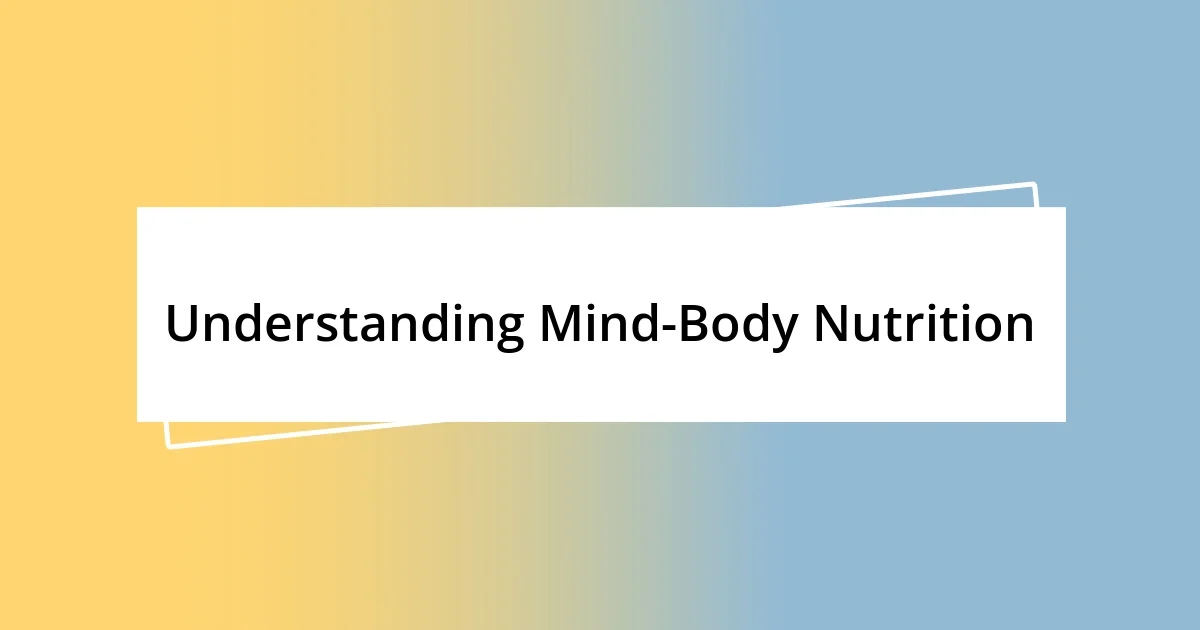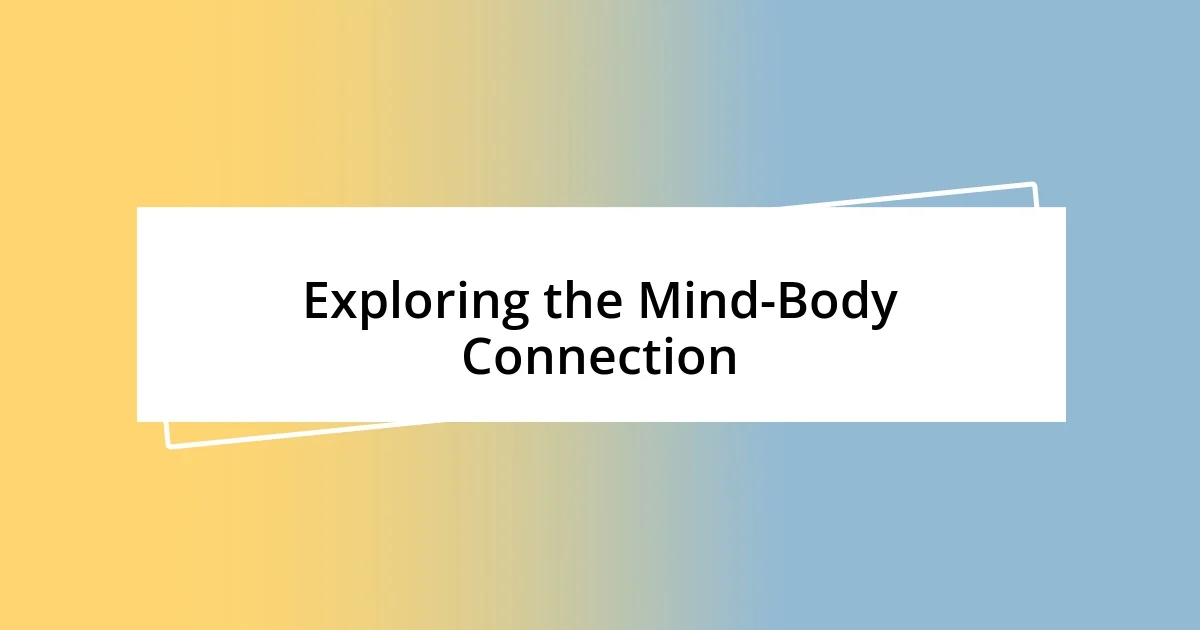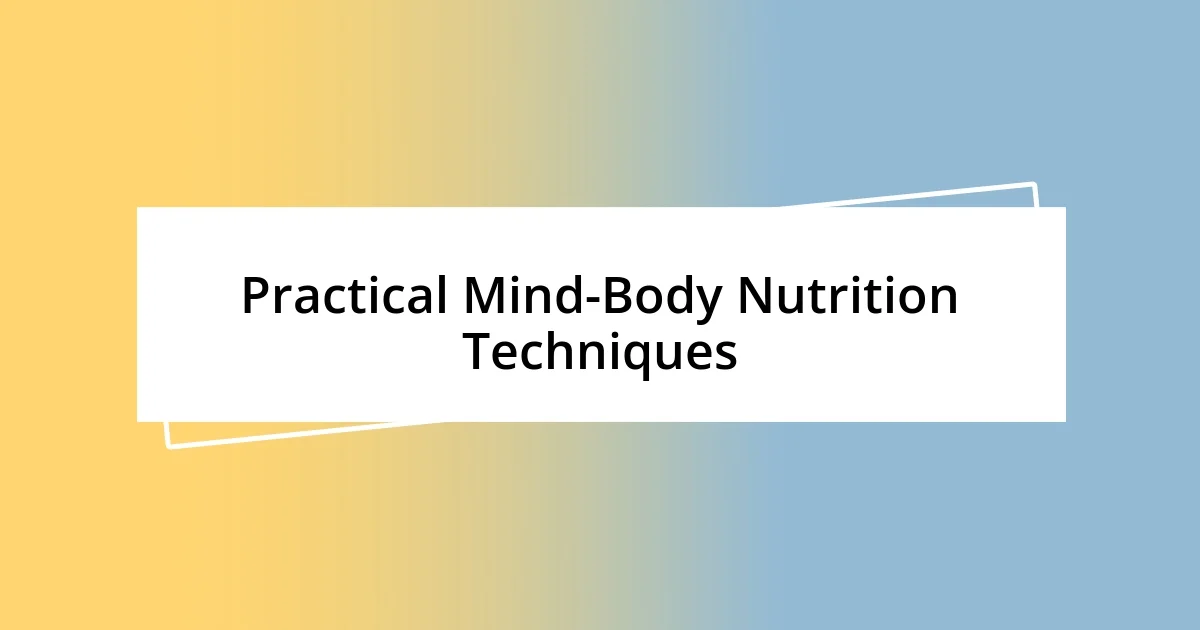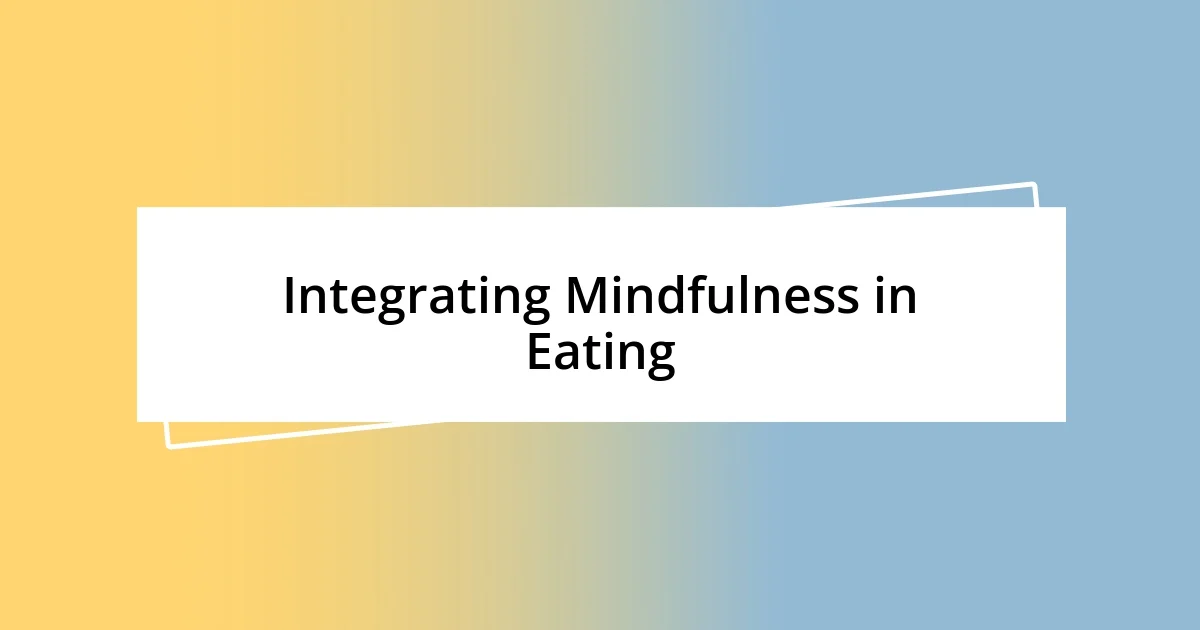Key takeaways:
- The journey of Mind-Body Nutrition emphasizes the connection between emotional states and eating habits, encouraging mindfulness and self-reflection during meals.
- Practicing gratitude, mindful eating, and journaling one’s food experiences enhances the awareness of how different foods affect mood and energy levels, leading to healthier choices.
- Self-compassion and community play crucial roles in the journey, highlighting the importance of enjoying cooking and sharing meals, while embracing occasional indulgences without guilt.

Understanding Mind-Body Nutrition
Mind-Body Nutrition is an approach that recognizes the deep connection between our eating habits and our emotional and mental states. I remember a time when I would eat mindlessly during stressful moments, often gravitating towards comfort foods that never truly satisfied me. Have you ever noticed how your mood shifts depending on what you eat?
One of the most enlightening aspects of Mind-Body Nutrition is understanding that it’s not just what we eat, but how we eat. I found that slowing down to savor my meals transformed my relationship with food. I began to ask myself, “Am I truly hungry, or am I simply seeking comfort?” This self-reflection prompted a shift towards more mindful choices, allowing me to align my nutrition with my emotions.
Ultimately, Mind-Body Nutrition teaches us to listen to our bodies and respect its needs. I often think about the moments when I enjoyed a meal with friends, fully present and engaged—it’s in those experiences that I’ve felt the most connected to my food. Isn’t it incredible how shared moments can enhance not just the meal, but our well-being too?

My Initial Experience with Nutrition
When I first began exploring nutrition, I approached it through a conventional lens, focusing on calories and macro ratios. In hindsight, I realize I was somewhat detached from the experience of eating itself, treating meals as mere fuel rather than opportunities for connection and satisfaction. It felt hollow at times, and I often wondered why I struggled with cravings even when I adhered to a strict diet.
As I delved deeper into this journey, I discovered the importance of listening to my body. I vividly recall attending a workshop where we practiced mindful eating. I began to savor the textures, colors, and flavors of food. I felt a profound shift—eating became more about nourishing my spirit than just my body. Remembering that moment, I now appreciate how enriching it is to genuinely enjoy what we eat, rather than merely consuming it out of obligation or habit.
Initially, I resisted the notion that my mood could influence my dietary choices, but the evidence was undeniable. On particularly rough days, I often found myself reaching for sugary snacks or comfort foods. A turning point came when I consciously decided to experiment with this realization, opting instead for whole foods that fueled my energy. That simple choice made a discernible difference in my mood and overall well-being, reinforcing the idea that nutrition profoundly impacts our emotional landscape.
| Aspect | Initial Belief |
|---|---|
| Connection to Emotions | Minimal awareness of emotional ties to eating |
| Food as Fuel | Viewed meals strictly as caloric intake |
| Mindful Eating | None practiced, focused on speed |
| Impact on Mood | Believed it had little influence |

Exploring the Mind-Body Connection
When I first became attuned to the mind-body connection, it felt like uncovering a hidden layer of my own experience with food. I remember sitting at the dinner table one evening, overwhelmed by the stresses of the day. I found myself reaching for seconds, not out of hunger, but to fill an emotional void. Recognizing this pattern was eye-opening; I realized that my relationship with food was indeed intertwined with my mental state.
- Eating Habits and Emotions: I reflected that I often sought food as a means of comfort during stressful times.
- Physical Sensations: I began to pay attention to how different foods made my body feel, noting the distinct effects of heavy vs. light meals.
- Intuitive Eating: Gradually, I embraced the practice of tuning in to my body’s signals, discovering what truly nourished me on both physical and emotional levels.
As I further explored this connection, the impact of my emotional landscape became strikingly apparent. I remember one particular day when I felt joy after receiving good news. I savored a vibrant salad loaded with greens and colorful vegetables. The flavors burst in my mouth, and I felt an indescribable sense of alignment—eat good food, feel good. It was during moments like these that I truly grasped how intertwined our thoughts and feelings are with our eating habits. Each meal could serve as a celebration of my well-being instead of just a routine necessity.

Practical Mind-Body Nutrition Techniques
In my journey, I found that practical techniques could significantly enhance my connection to food and my body. One of the most impactful methods I discovered was the practice of gratitude at mealtime. Before digging in, I took a moment to reflect on where the food came from and the effort that went into bringing it to my plate. This simple act transformed my meals from a mundane obligation into a meaningful experience, and I often felt a wave of appreciation wash over me. Have you ever noticed how that shift in perspective can change everything?
Another technique that resonated with me was creating a designated eating space. I started setting the table, lighting a candle, or even playing soft music while eating. These small rituals helped me detach from distractions like my phone or television, allowing me to focus on the flavors and textures of the food. It became a practice of mindfulness, where each bite was savored rather than rushed. Reflecting on this, I realize how often we overlook the beauty of the present moment while eating—how do you ensure you’re truly present at mealtime?
Lastly, I adopted a habit of journaling my food experiences and emotional states. This technique not only clarified my food preferences but also revealed patterns I hadn’t noticed before. I noted how certain meals made me feel energetically or emotionally. Looking back through my entries, I was amazed at how specific foods correlated with my mood. It’s fascinating to think how self-reflection can unlock deeper insights about our relationship with food and how we can tailor our choices to nourish both body and mind. Have you tried journaling your eating experiences? If not, it might be just the catalyst you need for change.

Integrating Mindfulness in Eating
Embracing mindfulness in eating begins with truly engaging with the moment. I remember a particular lunch break when I decided to forgo my usual habit of scrolling through my phone during meals. Instead, I focused solely on the meal in front of me—the crunch of the fresh vegetables, the warmth of the roasted grains. How often do we rush through meals without noticing the flavors? This practice not only heightened my enjoyment but also helped me feel a deep sense of gratitude for the nourishment I was receiving.
Another time, I practiced mindful breathing before a meal. I took a few deep breaths, grounding myself and tuning into my body. This small ritual created space for awareness, allowing me to notice how hungry I really was and how my body felt in that moment. It’s incredible how just a few breaths can shift my perspective. Have you ever tried pausing before you eat? That intentional moment often leads to a more satisfying meal experience for me and makes me more conscious of what I’m about to consume.
I also discovered the joy of being present with my food by exploring the sensations and textures while eating. One evening, I treated myself to a beautifully arranged charcuterie board. As I savored each bite, noticing the creaminess of the cheese and the sweetness of the fruits, I found myself reflecting on how the experience felt like a mini celebration. Isn’t it extraordinary how food can elevate our moods and mark special moments? Integrating mindfulness has undoubtedly deepened my relationship with food, creating vibrant connections that nourish not just my body but my spirit as well.

Tracking My Progress and Results
Tracking my progress through this mind-body nutrition journey has been an enlightening experience. I started by documenting not just what I ate, but how each meal affected my mood and energy levels. There was a time, after enjoying a vibrant salad loaded with colorful veggies, when I felt an unexpected surge of energy that I hadn’t experienced in a while. I couldn’t help but wonder: how many of us overlook the powerful impact food has on our well-being? This realization propelled me to keep a detailed log, helping me to visualize the connection between my food choices and my emotional states.
As I continued journaling, I began to notice certain patterns emerging. For example, I felt noticeably lighter and happier after meals rich in whole grains and fresh produce. Conversely, the days filled with processed snacks left a weighty feeling, both physically and emotionally. Reflecting on these insights has been a game-changer for me—how often do we stop to investigate the effects of what we consume? By tracking these associations, I not only highlighted effective choices but also began to crave the foods that truly nourished my body and spirit.
The real magic happened when I revisited my entries. I remember reading through a week’s worth of reflections and suddenly realizing how directly my mood correlated with my nutrition. One day, I wrote about feeling sluggish after a takeout meal, and the next, I was over the moon after cooking a healthy dinner from scratch. Can you recall a time when you felt a surge of satisfaction after making nourishing choices? These moments of clarity have become a roadmap, guiding me toward more mindful eating habits and deeper connections to the food I choose.

Lessons Learned from My Journey
Reflecting on my journey with mind-body nutrition, I’ve unearthed a profound truth: food isn’t just fuel; it’s an experience. I recall a rainy afternoon when I decided to experiment with a new recipe. As I chopped fresh herbs, the vibrant colors caught my eye, and I felt a surge of excitement. That simple act of cooking became a therapeutic moment, reminding me that preparation is just as important as consumption. Have you ever felt a rush of happiness when creating something from scratch?
Another lesson that struck me deeply is the importance of self-compassion. There were days when I found myself reaching for comfort foods, and initially, I felt guilt. However, I learned to acknowledge those cravings without judgment. One evening, after a particularly long day, I turned to warm macaroni and cheese. Instead of shaming myself, I allowed the comforting taste to wrap around me like a hug. Recognizing emotional triggers has taught me that it’s okay to indulge sometimes; it’s how I bounce back that truly matters.
Lastly, I discovered the beauty of community in this journey. Joining a local cooking class not only expanded my culinary skills but also connected me with like-minded individuals. Sharing meals and stories over a table of delicious dishes created a unique bond—it felt like nourishment for the soul. Isn’t it fascinating how food can bring us together in such meaningful ways? This experience reinforced my belief that nurturing relationships is just as vital as nurturing our bodies.














